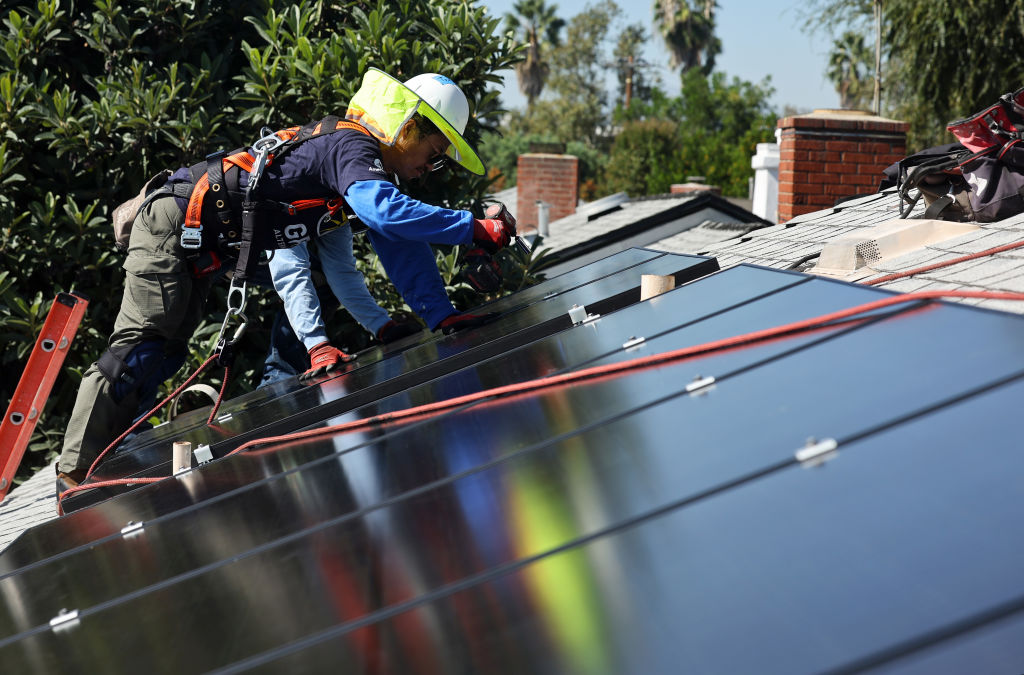Senate candidates embrace clean energy, but split on how US should fund transition
October 16, 2024

Independent U.S. Sen. Angus King sees renewable energy sources as having the potential to free the United States from foreign oil markets.
And he believes Maine — a state with limited benefits from the fossil-fuel based economy — is poised to be a leader in the growing clean energy economy given its abundant supply of wind and hydropower.
“Instead of continuing our reliance on fossil fuels, the United States needs to take advantage of the massive cost reductions in renewable energy and storage and embrace a more secure, sustainable, and affordable energy future,” King wrote on his website.
Maine Morning Star asked King and his three challengers in the upcoming U.S. Senate election where they stand on certain aspects of environmental and energy policy, specifically offshore wind and the electrification of transportation.
Both topics have dominated conversations in Maine, splitting the parties with Democrats largely supporting the move toward more renewable energy sources and Republicans pushing back, citing concerns about high cost burdens on ratepayers.
Neither King nor Republican challenger Demi Kouzounas responded to specific questions from the Morning Star, so details about their stances were compiled through social media posts and available public information.
While no candidate outright opposes clean energy, they differ in how strongly they’d like to see the U.S. push for such a transition. Kouzounas sets herself apart by showing skepticism over the country’s efforts to adapt to greener power, often claiming on social media that those efforts increase costs for ratepayers.
Offshore wind
Efforts are underway to move forward with the goal outlined in Maine law for the development of an offshore wind industry in the Gulf of Maine capable of producing three gigawatts of energy by 2040.
At the end of October, the federal Bureau of Ocean Energy Management will auction commercial leases off the coast of Maine, Massachusetts and New Hampshire. And the state of Maine has already reached an agreement with the agency for a research array with up to 12 floating turbines.
A member of the Energy and Natural Resources Committee, King supported the Inflation Reduction Act, which provided significant federal funding and incentives for states to accelerate the transition to clean energy — including offshore wind.
King also joined the rest of Maine’s congressional delegation and Gov. Janet Mills in a successful effort to exclude a vital lobster fishing area, known as Lobster Management Area 1, from wind development.
If elected to Congress, Democratic candidate David Costello said he would absolutely support efforts to further the development of offshore wind. He spoke of the industry’s potential to deliver not only clean and reliable energy, but also job opportunities and public health benefits.
He believes Congress should expand the related tax credits and expedit the permitting process for necessary infrastructure such as ports, platforms and transmission lines.
Overall, Costello told Maine Morning Star the U.S. should be investing at least twice what it already is in diversifying and developing domestic, clean energy sources.
Independent candidate Jason Cherry agrees the U.S. should diversify its energy profile and would support efforts to develop clean energy alternatives, but he’d like to see more collaboration with other countries. For example, he said Maine could work with Canada to invest in joint energy projects that reduce costs for Mainers.
“For the nation, our federal government should be funding initiatives to develop cheaper and cleaner energy as one of our top priorities,” Cherry said.
Kouzounas criticized wind power for not being as clean as promised, calling it a “‘green’ half measure” in an X post last month. While fossil fuels are needed to produce the actual wind turbines, using wind to produce energy is less harmful to the environment than many other energy sources, according to the U.S. Energy Information Administration.
Also on social media, Kouzounas has said she would prioritize affordable energy solutions, but doesn’t specify what those would be. She also called Maine’s net energy billing program flawed, claiming that it raises costs for low-income households while subsidizing the wealthy.
Net energy billing in Maine allows people to offset the cost of their utility bills by using the output from their own renewable generators or sharing in someone else’s.
“Let’s be clear: this isn’t about being anti-renewable energy,” Kouzounas wrote. “It’s about demanding leadership that balances environmental goals with the economic realities of everyday Mainers.”
Electrifying transportation
Earlier this year, the Maine Board of Environmental Protection considered, but ultimately rejected, the Advanced Clean Cars II Act, which would have required 82% of new vehicles sold in the state to be electric by 2032.
The rule originated in California and has been adopted by more than a dozen states since including New York, Vermont and Massachusetts. The rule would not affect existing cars in the state.
Maine has received millions of dollars from the federal Bipartisan Infrastructure Law to deploy electric vehicle charging stations throughout the state and pilot an electric ferry program.
On his website, King says electrifying transportation is key to reducing carbon emissions.
The Inflation Reduction Act — which King supported — also provides up to $7,500 in tax credits for people who purchase electric vehicles. To be eligible for the new clean vehicle tax credit, joint filers need to earn $300,000 or less and heads of household filers can’t earn more than $225,000.
In an interview with Maine Public, Kouzounas said she is for infrastructure funding, “but just not all the extra padding in [the Bipartisan Infrastructure Law.]”
Alternately, Costello said he would support extending those tax credits. Making it easier and more affordable for Mainers to purchase zero-emission vehicles is the most effective way to reduce transportation-related carbon emissions in the state, he said.
Cherry supports efforts to electrify transportation, especially to alleviate the impact of climate change, but he said it needs to be economically feasible. He added that it’s important for Bipartisan Infrastructure Law funding to be first spent on urgent repairs to highways and bridges, and then the remaining money can aid the transition to cleaner transportation.
He added that the money spent on greener transportation should prioritize efforts that would be most impactful in furthering the transition to electrified transportation such as rechargeable battery development.
Curious where other candidates for federal office stand on these issues. Read more about those running for the 1st and 2nd Congressional Districts.
YOU MAKE OUR WORK POSSIBLE.
Search
RECENT PRESS RELEASES
Related Post


